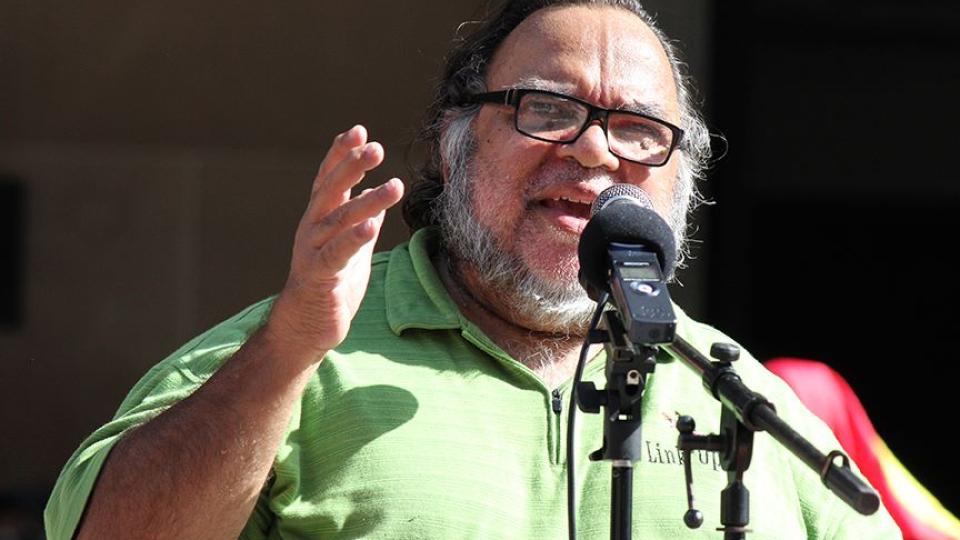Sam Watson: 'Our mob are ready to struggle'

Captain Arthur Phillip took formal possession of the colony of New South Wales and raised the flag for the first time in Sydney Cove on January 26, 1788.
In the early 1880s the day was known as “First Landing”, “Anniversary Day” or “Foundation Day”. In 1946 the Commonwealth and state governments agreed to unify the celebrations on January 26 and call it “Australia Day”.
But for the First Peoples of this country, the Aboriginal community, it is known as "Invasion Day", “Day of Mourning” or "Survival Day". To many Aboriginal Australians there is little to celebrate and it is a day to commemorate a deep loss: loss of their sovereign rights to their land, loss of family and loss of the right to practice their culture.
Since 2006 it has also been called “Aboriginal Sovereignty Day” to reflect that all Aboriginal nations are sovereign and should be united in the continuous fight for their rights.
This year again, while official ceremonies and celebrations are being held in cities and towns across the country, Aboriginal people and their supporters are holding rallies, marches and other events to protest the continuing racist oppression they face, and to affirm the survival of their peoples and their cultures after 228 years of occupation.
SAM WATSON, a prominent Murri activist in Brisbane and Aboriginal affairs spokesperson for Socialist Alliance, spoke to Green Left Weekly's JIM McILROY on January 20 about some of the key issues facing the Indigenous community this Invasion Day.
* * *
Not much has changed regarding the main issues facing our people in 2016. Our first priority is survival under a racist system, which has not basically changed from the past.
Aboriginal people are being brutalised, bashed, even murdered by police to this day. Cops can use tasers on our people with complete impunity.
In the past 12 months, such attacks have increased, with the cops being outside any real public accountability. The police continue to operate without any effective form of legal control or redress.
In Brisbane, over the past few days, cops have again terrorised our people. Police were called to an incident, and as a result of their actions a young man has a broken arm.
The police then reacted against an Aboriginal woman, and mistreated her as well. I'll be calling for a Royal Commission into incidents across the nation where police have overreacted and there has been injury to members of the public.
There has also been an escalation in monitoring and harassment by cops of our communities and the rate of deaths in custody has continued to rise in recent times.
What we need is a national agency to deal with all deaths in custody, which would have a flying team to intervene in any reported cases. This team would take charge of all forensic evidence immediately, independently of the police.
There has been a marked increase in deaths in custody of various kinds — non-Indigenous as well as Indigenous — involving the homeless, people with mental illnesses and so on. Police always seem to discover a weapon at the scene of these incidents. A national deaths in custody agency would take control of any such evidence, investigate and prosecute police, without fear or favour.
This trend to police violence against Black people is international. The Black Lives Matter movement in the US is a key example, as is police repression of Black people in the UK.
The issue of the Stolen Generations has not gone away: Aboriginal children are still being taken from their families. There is a national convergence to Canberra planned for February 11. The mothers and grannies movement is preparing to challenge the federal government to take action to prevent the forced removals of Aboriginal children from their families.
Senior members of the grannies movement are dying, and the politicians are stalling to undermine their campaign.
Governments have failed to make substantial progress in reaching Close the Gap targets for the Aboriginal community and have instead made $500 million in cuts to federal funding for Aboriginal services.
The problem goes back to the era of the John Howard government. Howard dismantled the Aboriginal and Torres Strait Islanders Commission (ATSIC) and $2 billion in funding was lost in the system. Frontline Aboriginal services in health, education and the legal area were slashed.
Now, ATSI people are facing enormous difficulties in making ends meet. One estimate in Queensland for example, shows that parents in this state, not just Indigenous, will need to pay $2500 for clothing, administration and other charges to keep their kids in school.
There are challenges facing the Aboriginal rights movement in 2016. We are under concerted attack, just like the trade union movement. We urgently need to come together and unite in solidarity with each other.
International solidarity with and among various world struggles is also crucial. Unity and solidarity among the oppressed is the only way to survive.
Prime Minister Malcolm Turnbull is not interested in engaging with the demands of our Aboriginal community. As a multi-millionaire, he lives in another world from us and represents the rulers of this racist system.
Our Aboriginal mob is up in arms and willing to fight. We need to become more politicised and organised, if we are to survive these attacks. We need to use Invasion Day 2016 as a launching pad for our vital campaigns this year.